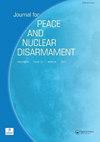重新审视核不扩散和军备控制的社会核查:寻求透明度
IF 1.4
Q4 INTERNATIONAL RELATIONS
引用次数: 1
摘要
在过去的几十年里,非国家行为体利用越来越容易获得的信息和通信技术,向相关公众和政府提供一系列问题的情报,包括令人关注的核活动。这给人一种印象,即提高透明度几乎肯定会使世界免于因违反条约的核扩散或核武库扩张而产生的核危险。事实上,让公民社会参与条约核查——或“社会核查”——的想法源于二战后科学家的和平运动。在这篇评论中,有人认为,今天一些突出的社会验证实例在精神上明显偏离了最初概念所提出的倡议。如今的努力已被一些为美国和西方霸权利益服务的国家所利用,对遏制核危险几乎毫无帮助。事实上,它们符合一种非政治化的社会验证概念。这篇评论概述了社会验证理论和实践的演变,并呼吁发起一场社区对话,以重新思考社会验证,以避免进一步巩固现状。本文章由计算机程序翻译,如有差异,请以英文原文为准。
Revisiting Societal Verification for Nuclear Non-proliferation and Arms Control: The Search for Transparency
ABSTRACT The last couple of decades have seen a surge in non-state actors wielding increasingly accessible information and communication technologies to provide intelligence to relevant publics and governments on a range of issues, including on nuclear activities of concern. This has prompted the impression that more transparency would translate almost surely to a world secure from nuclear danger arising from treaty-violating nuclear proliferation or nuclear arsenal expansion. As a matter of fact, the idea of involving civil society in treaty verification – or “societal verification” – hails from the post-WWII scientists’ peace movement. In this commentary, it is argued that some of today’s prominent instances of societal verification deviate significantly in spirit from initiatives suggested by the original conception. Today’s efforts have lent themselves to co-optation by states in the service of US and Western hegemonic interests and do little to curb nuclear danger. Indeed, they conform to a depoliticized conception of societal verification. This commentary sketches the evolution of the theory and practice of societal verification and calls for the launch of a community conversation to rethink societal verification in such a way as to avoid the further entrenchment of the status quo.
求助全文
通过发布文献求助,成功后即可免费获取论文全文。
去求助
来源期刊

Journal for Peace and Nuclear Disarmament
INTERNATIONAL RELATIONS-
CiteScore
1.30
自引率
0.00%
发文量
36
审稿时长
12 weeks
 求助内容:
求助内容: 应助结果提醒方式:
应助结果提醒方式:


